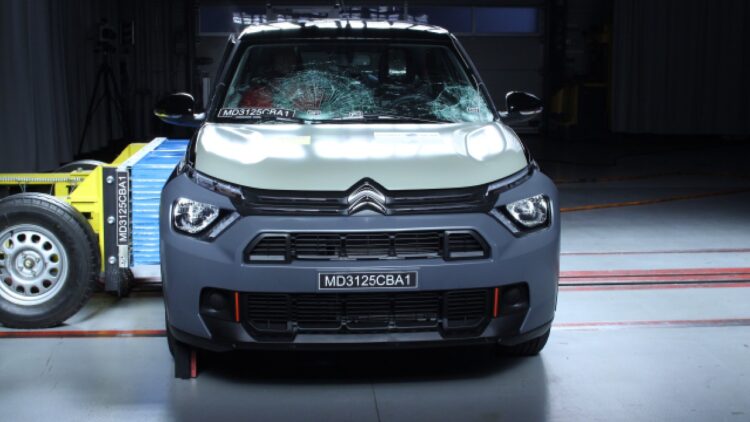The mid-size SUV has bagged 4 stars at the Bharat NCAP
The Citroen Basalt managed to secure a disappointing 0-star rating at the Latin NCAP. The huge difference, in comparison to the Bharat NCAP score, in the final ratings of the coupe SUV is quite surprising. Having been around in this industry for over 5 years now, I must mention that the protocols for almost every NCAP around the world are different to each other. That explains why the same car scores differently in another part of the globe. In general, the Latin NCAP is considered slightly more stringent in comparison to the Bharat NCAP. Also, the safety equipment on the made-in-Brazil model was lacking in contrast to the made-in-India version.
Citroen Basalt at Latin NCAP
As per the official report by Latin NCAP, the Citroen Basalt bagged 39%, 58%, 53% and 35% points in Adult Occupant Protection, Child Occupant Protection, Pedestrian and Vulnerable Road Users Protection and Safety Assist Systems, respectively. All these contribute to a rather disappointing 0-star rating. Note that the SUV had 4 airbags, front seatbelt pretensioner and loadlimiter, ISOFIX child seat mounts, seatbelt reminder, ESC and GTR 9 – UN 127 Pedestrian Protection as standard. As a result, the crash test confirmed 0 stars.
Adult Occupant Protection
In the AOP category, the Citroen Basalt scored 9.87 points out of 16 in the Frontal Offset Deformable Barrier test, 1.87 points out of 3 in the Wiplash Rear Impact test, 8 points out of 8 in the Side Movable Deformable Barrier test and the Side Pole Impact test was not performed. In the frontal impact test, head and neck protection was good, but chest protection was weak for the passenger and marginal for the driver, with marginal knee protection and adequate tibia protection. The footwell was stable, but the bodyshell was rated unstable, unable to withstand further loads. Side impact protection was good, but no side pole test was done due to lack of head airbags, whiplash protection was marginal, the car met UN R32 rear impact requirements, and it lacked AEB City.
Child Occupant Protection
In the COP section, the coupe SUV managed to secure 19.88 points out of 24 in the Dynamic Score test, 4.71 points out of 12 in the CRS Installation test and 4 points out of 13 in the Vehicle Assessment test. The 3-year-old child seat, installed rearward facing with ISOFIX and a support leg, prevented head exposure and provided good protection. The Q1.5 seat also offered nearly full protection, though with slightly higher chest deceleration. In the side impact test, Q1.5 protection was full, but the Q3 dummy’s head contacted the interior, and some CRS installation tests failed. The car has standard ISOFIX with i-Size compliance and three-point seatbelts in all positions, but it lacks proper airbag warnings and passenger airbag disconnection, failing to meet Latin NCAP requirements.
Pedestrian and Vulnerable Road Users Protection
Next, we move on to the Pedestrian and Vulnerable Road Users Protection segment. Here, it bagged 13.68 points out of 24 in the Head Impact test, 5.95 points out of 6 in the Upper Leg Impact (Pelvis) test and 6 points out of 6 in the Lower Leg Impact test. All these combine for a total score of 25.62 points. The car meets UN127 pedestrian protection regulations, with mostly good, adequate, and marginal head impact protection and only a few poor areas near the windscreen and A-pillars. Upper leg protection was adequate to good, and lower leg protection was good. However, the car does not offer AEB VRU.
Safety Assist Systems
This is where things get very interesting. Since Seatbelt Reminder and Speed Assistance is not standard across the range, the vehicle is awarded 0 points in this regard, even if the higher variants possess these amenities. The car offers a seatbelt reminder (SBR) only for the driver, but it does not meet Latin NCAP requirements and is absent for other seats. Electronic Stability Control (ESC) is standard, with a maximum Moose test performance of 95 km/h under ADAC and 75 km/h under Consumer testing. It lacks a standard speed limitation device. Blind Spot Detection (BSD), Lane Support Systems (LSS), Road Edge Detection (RED), and AEB Interurban are not available according to Latin NCAP technical and availability requirements. Overall, the vehicle’s safety assist features are very limited.
Editor’s Note
Yatharth Chauhan, Managing Editor
Having closely followed NCAP protocols across global markets, I can confidently say that this stark contrast between the Basalt’s Latin NCAP and Bharat NCAP ratings highlights just how varied safety assessments can be. Latin NCAP’s far more stringent protocols and lower safety kit on the Brazilian-spec model clearly played a big role here. In India, where the Basalt comes better equipped, its 4-star Bharat NCAP rating does inspire more confidence, but this Latin NCAP result is a reminder that consistent global safety standards are still a long way off. For informed buyers, it underlines the importance of looking beyond star ratings and understanding what goes behind them.
Also Read: MS Dhoni Spotted Driving His Citroen Basalt Dark Edition


